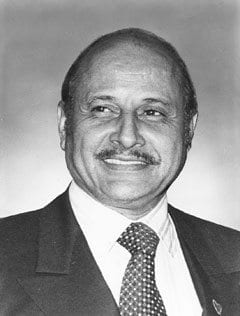
Percy Sutton, the pioneering civil rights attorney who represented Malcolm X before launching successful careers as a political power broker and media mogul, has died. He was 89.
The son of a slave, Sutton became a fixture on 125th Street in Harlem after moving to New York City following his service with the famed Tuskegee Airmen in World War II. His Harlem law office was founded in 1953.
The consummate politician, Sutton served in the New York State Assembly before taking over as Manhattan borough president in 1966, becoming the highest-ranking black elected official in the state.
In 1971, with his brother Oliver, Sutton purchased WLIB-AM, making it the first black-owned radio station in New York City. His Inner City Broadcasting Corp. eventually picked up WBLS-FM, which reigned for years as New York’s top-rated radio station, before buying stations in Los Angeles, San Francisco, Detroit and San Antonio between 1978-85.
The Texas purchase marked a homecoming for the suave and sophisticated Sutton, born in San Antonio on Nov. 24, 1920, the youngest of 15 children.
Among Sutton’s other endeavors was his purchase and renovation of the famed Apollo Theater when the Harlem landmark’s demise appeared imminent.
Sutton’s father, Samuel, was born into slavery just before the Civil War. The elder Sutton became principal at a segregated San Antonio high school, and he made education a family priority: All 12 of his surviving children attended college.
When World War II arrived, Sutton’s enlistment attempts were rebuffed by Southern white recruiters. The young man went to New York, where he joined the Tuskegee Airmen.
After the war, Sutton earned a law degree in New York while working as a post office clerk and a subway conductor. He served again as an Air Force intelligence officer during the Korean War before returning to Harlem in 1953 and establishing his law office with brother Oliver and a third partner, George Covington.
In addition to representing Malcolm X for a decade until his 1965 assassination, the Sutton firm handled the cases of more than 200 defendants arrested in the South during the 1963-64 civil rights marches. Sutton was also elected to two terms as president of the New York office of the NAACP.
Sutton was elected to the state Legislature in 1965, and quickly emerged as spokesman for its 13 black members. His charisma and eloquence led to his selection as Manhattan borough president in 1966, completing the term of Constance Baker Motley, who was appointed federal judge.
Associated Press






